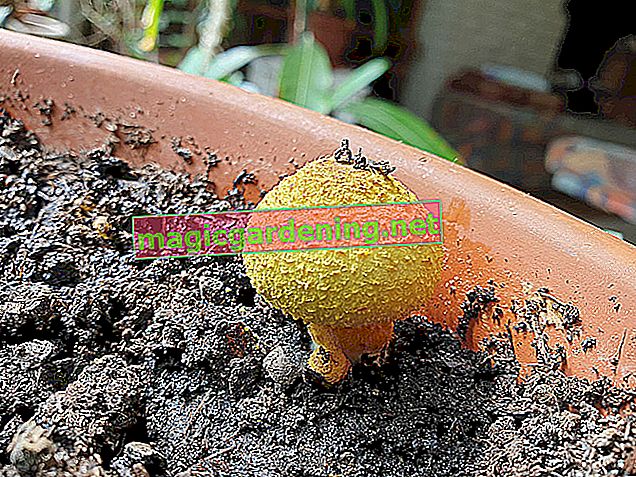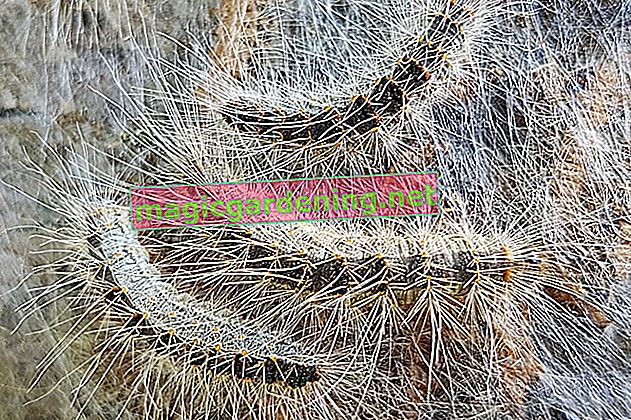
the essentials in brief
- The garden spider can bite and is also slightly poisonous, but it does not pose a threat to humans
- A spider bite should be refrigerated
- Garden spiders are useful because they catch unpopular insects
- Light sources draw the spiders into the house
Is the garden spider dangerous?
Slightly toxic, but completely harmless. This is the quintessence of the potential danger of a garden spider for humans. Indeed, in the spider realm it is the rule that poisonous substances are used in the hunt for prey. Garden spiders always have a small supply with them in tiny poisonous claws on their toothless mouth. If an insect gets caught in the wheel-shaped net, it is injected with the paralyzing poison in a flash. The spider then hurriedly wraps its victim with spider silk in order to suck it out immediately or later.
also read
- Is the philodendron poisonous to humans and animals?
- Is the clematis toxic to humans and animals?
- The poinsettia is poisonous for humans and animals
What comes to a bad end for the prey of a garden spider is for humans without serious consequences. A direct confrontation only occurs when the orb web spider cannot find an escape route. During a bite attack, the garden spider has a lot of trouble penetrating human skin with its very short, poisonous claws. If it unfortunately hits delicate skin areas, mild discomfort occurs, such as after a harmless mosquito bite.
Slight swellings, redness and annoying itching will subside after a short time if the poisonous claws of a garden spider should prick the epidermis. In rare cases, systemic symptoms such as headache, nausea and muscle cramps occur. More severe symptoms are, of course, an indication of an allergic reaction and require an appointment with your family doctor to clarify.
YoutubeDigression
Garden spiders - danger for allergy sufferers
Allergy sufferers shouldn't take confrontation with insects lightly. In this regard, the garden spider is no exception, although its bite is usually classified as harmless. If the smallest amounts of the spider venom get under the skin, shortness of breath, circulatory problems and similar symptoms of allergic shock are inevitable. When gardening, long-sleeved clothing, rubber boots and work gloves for allergy sufferers are good protection against the bite of a garden spider. The personal emergency kit should still be close at hand because it saves lives in an emergency.Home remedies relieve the spider bite
The bite of a garden spider is usually not dangerous. However, the attack can be associated with unpleasant consequences for those affected. The more delicate the skin of the spider victim, the more agonizing symptoms appear. Adults register symptoms similar to those after a mosquito bite. In children and babies, in the worst case, local swelling and pain up to severe itching can be complained about. The following home remedies alleviate unpleasant side effects when a garden spider has bitten:
- clear water : rinse the wound under running water
- Ice : place ice cubes on the skin
- Slice of onion : Cut onion and press the bite wound
- Slice of cucumber : Cut the cucumber into slices and place on top

As an immediate measure in the garden, grab a handful of cold, black earth and press the clod of earth onto the bite wound. Dairy farmers swear by this home remedy from the “dirty pharmacy” to this day, and they regularly come across spiders in the mountain pastures in summer and are occasionally bitten.
Consult doctor with baby and toddler
Tender baby skin can easily penetrate even the tiny, venomous claws of a garden spider. Correspondingly severe symptoms can set in after a spider bite. Furthermore, it has often not yet been found out in small children whether there is an allergy to spiders. If the first symptoms are alleviated with home remedies, we recommend that you consult your pediatrician. Thick swellings, severe redness, restlessness, fever or even shortness of breath are not a case for self-medication in children.
Garden spider does not bite on purpose
Anyone who suspects bad intentions after being bitten by the long-legged culprit is doing the harmless garden spider an injustice. In fact, all species only have prey insects in mind. Under no circumstances do the spiders with the cross on their abdomen crawl after a person to bite him. If the involuntary confrontation is acknowledged with a bite, the garden spider feared for its life because all escape routes were blocked. Instead of hitting the arachnid or waving your hands in panic, you allow the shy insect to escape and avoid a defensive bite.
Reliably identify the garden spider - profile

The unmistakable distinguishing feature of a garden spider is a cross made up of five spots on its abdomen. Four oblong blobs gather around a rounded mark in the middle. Further characteristics of the striking arachnids dispel any doubts about their presence. The following profile summarizes the attributes that characterize the native spider species:
- Insect family: Real orb web spiders (Araneidae)
- Genus: Garden spiders (Araneus)
- Size: 5-18 mm
- Body color: depending on the species, black, light to dark brown, yellowish, reddish
- Occurrence: Europe, focus on Central Europe with 10 species
- Habitats: open landscape, gardens, orchards, pine forests, raised bogs, hedges
- Food: insects of all kinds
- Trapping method: cobwebs, bite and simultaneous injection of paralyzing poison
- Life expectancy: 3 to 4 years
- Status: not critically endangered
- Toxic for humans: slightly toxic, without any serious hazard potential
Apart from a short mating season in late summer, cross spiders prefer a solitary life. Males looking for a bride prefer to roam around instead of spinning a web. However, both sexes have mastered the art of spinning equally. Cross spiders build the impressive orb webs to catch prey. Mostly they sit patiently in the center of the ingenious catch construction. Some species lay a signal thread to the net and use minimal vibrations to register immediately if an insect gets tangled in it. The alarmed garden spider rushes at lightning speed on its catch and bites. The spider can also take on significantly larger prey because it has an advantage thanks to the paralyzing poison.
With artfully woven wheel nets, cross spiders overshadow many human achievements.
Overview of cross spider species

Garden spiders are masters of adaptation. The widespread genus of the orb-web spider family has evolved into diverse species with individual characteristics, perfectly matched to the local framework conditions in the habitat. The following table lists common garden spider species by name with information on special characteristics:
| Surname | scientific name | Common name | size | special feature |
|---|---|---|---|---|
| Garden spider | Araneus diadematus | German garden spider | 7-15 mm | variable coloring according to brightness |
| Vierfleckkrossspider | Araneus quadratus | orange or yellow garden spider | 10-18 mm | Cross of four spots |
| Horned garden spider | Araneus angulatus | prickly garden spider | 8-16 mm | two humps on the abdomen |
| Marsh spider | Araneus alsine | red garden spider | 8-15 mm | most colorful kind |
| Marbled garden spider | Araneus marmoreus | white garden spider | 9-15 mm | extra wide abdomen |
A multi-faceted body color is characteristic of all cross spider species. Hence, trivial names that refer to the color of the spider's body should be treated with caution. The color scheme of a garden spider adapts to the current incidence of light. Marbled cross spiders love variety and appear in bright orange, elegant white or subtle gray.
Are garden spiders poisonous to pets?
Concerned pet owners can be given the all-clear about the risk of poisoning from garden spiders. The shy insects only bite curious sniffs from dogs or cats if escape routes are closed to them. This can be painful for your darling at first, combined with corresponding panic-like reactions, such as can be observed after a wasp sting, for example.
A toxic reaction is only to be feared on thin skin areas. If a garden spider bites a cat or dog in the armpit or groin area, for example, temporary swellings and reddening appear around the bite wound. However, the symptoms subside within a short time. The garden spider bites a tiny wound cavity that closes itself quickly. There is no sting left in the wound that could torment the animal, like after a bee or wasp sting. In other areas of the skin, the short, poisonous claws of garden spiders and other conspecifics do not penetrate so deeply that the four-legged victims have to pay for it.

background
Garden spiders - welcome beneficial insects in the garden
The guest performance of garden spiders makes the hearts of nature lovers beat faster. Where the shy arachnids settle, the ecological balance is in balance. Orb-web spiders diligently make their contribution to natural pest control in the bed. The menu includes a wide range of insects, including a number of pests and pests such as aphids, flies and mosquitoes.Drive away the garden spider - how to do it with strategy
All pleadings for garden spiders as harmless beneficial insects fall on deaf ears when the long-legged journeymen sneak into the house. Nobody likes to share their bedroom with the unpopular insects. Caring parents do not want to tolerate garden spiders molesting their children or the baby in the cradle. The prejudice-laden aversion to garden spiders in the house and apartment is of course no reason to combat the beneficial organisms with chemical insecticides. Two simple tricks will make the uninvited arachnids never be seen again:
light off
Light sources magically attract cross spiders because they hope for fat prey there. For this reason, the spiders can often be found on lamps, on balconies, patios and in the winter garden. Orb web spiders sometimes get lost in living spaces from these locations. As an effective defense against uninvited visitors, simply turn off the lights around the house. Because of this, no night light should be on in the children's room, at least not in the immediate vicinity of the bed or cradle.
Remove cobwebs
Garden spiders are hardworking and persistent. If the insects like a location, they will set up permanently. By removing the characteristic wheel nets promptly, you encourage the spiders to look around for a new hunting ground far away from the building. Perseverance is crucial for the control strategy, because cross spiders weave a fresh safety net every night if necessary.
Classic home remedies for repelling insects are ineffective if you want to get rid of garden spiders in the house. What works wonders against mosquitoes leaves the frugal arachnids cold. Experts from the German Wildlife Foundation have found that garden spiders are extremely undemanding when it comes to scents and aromas. In a series of experiments, orb-web spiders ate unmoved prey that had previously been dipped in vinegar or Epsom salt.
frequently asked Questions
Are garden spiders poisonous to humans?
Every garden spider has poisonous substances in their luggage for hunting prey. This fact cannot be denied and is the source of numerous myths and legends about the potential for danger. In fact, the amounts of poison are far too low to cause harm to humans or pets. Furthermore, the arachnids' poisonous claws are too short and too weak to penetrate human skin. All in all, it can be said that cross spiders are not dangerous. In the worst case, a bite causes symptoms similar to a mosquito or wasp sting.
I was bitten by a garden spider while working in the garden - what to do?
Do not scratch the bite wound to prevent bacteria from entering and causing infection. If there is no doubt that it is a cross spider, disinfect the wound with iodine, put a plaster on and you can safely go back to business. Use a cooling pad or ice cube to relieve slight swelling or itching. On the other hand, are you unsure whether the culprit was actually a harmless garden spider? Then please visit your family doctor. Ideally, you should catch the long-legged culprit or at least take a photo for clear identification.
I discovered a garden spider in my apartment. How do I get rid of the spider?
When the temperatures drop in autumn, many species of spiders look out for safe winter quarters. Human dwellings are also very popular with garden spiders, because fat prey in the form of house flies and mosquitoes can be expected here. If you don't want to tolerate the long-legged roommates in your apartment, we recommend catching the useful insectivores with a glass. Put a conventional drinking glass over the uninvited guest. Now slowly slide a piece of cardboard under the glass. You then carry the spider outside and release it into the wild.
Are garden spiders poisonous to dogs?
Garden spiders inject their prey with a paralyzing poison that is specially designed for flies, wasps and other insects. The toxin poses no serious danger to mammals such as dogs and cats. Apart from that, garden spiders seek their salvation in flight when a dog approaches. If the spider bites in its distress and catches a delicate area of skin, in the worst case, slight swelling, redness and itching occur. You can relieve this with cold compresses and a hydrocortisone cream against itching.
We spotted several garden spiders on and in the house. How do we get rid of the spiders without killing the animals?
Garden spiders generally do not seek to be around people. In contrast to house spiders and trembling spiders, the insects usually only get into the building by accident. This is always the case when the outdoor lighting attracts prey from a garden spider in droves. If you do not switch on the lights on the house for a while, the location will be of no interest to the long-legged hunters. You should remove the distinctive web nets regularly to scare off the unnerved cross spiders. Classic home remedies such as essential fragrances or vinegar have proven useless in practice.
Where do garden spiders stay most often?
The diverse family of garden spiders populates almost all habitats in Europe that mother nature has to offer. As the name suggests, the garden spider prefers a life in gardens and parks. In the forest there is a good chance of meeting the horned garden spider. Moist meadows are the territory of the four-spot garden spider. The red garden spider loves moist herbaceous layers in fields, meadows and forests. The giant garden spider is so far at home in hot, dry regions on the Mediterranean. However, the majestic garden spider species is on its way north in the wake of global warming and has already been spotted in Austria.
Do the large orb web cobwebs always come from a cross spider?
Garden spiders are only one of twenty-five genera in the family of real orb web spiders. The family is represented worldwide with more than 160 species. An orb web cobweb can only be assigned to a cross spider if the insect is in it. Otherwise, the builder can be a pumpkin spider (Araniella), bridge spider (Larinioides) or heather circular spider (Cercidia). Last but not least, numerous species of weaving spiders (Tetragnathidae) have mastered the art of spinning expansive orb webs. Even experienced arachnologists reach their limits when it comes to correctly assigning an orb web cobweb without a spider.
Is the garden spider critically endangered?
Of the 10 or so garden spider species native to Central Europe, the marsh cross spider (red cross spider, strawberry cross spider) is the only species that is seriously threatened with extinction. Ruthless use of pesticides, the destruction of biotopes and natural retreats intensify the struggle for survival for all cross spider species. In 2010 the garden spider was named Spider of the Year in order to draw attention to the increasing threat to its habitats.
Tips
With masterfully woven webs, the garden spider dwarfs human achievements. A single one of their ingenious bike nets consists of silk threads up to 20 meters long that stretch three times without breaking. Based on their weight, spider threads are four times stronger than steel. In less than an hour, the garden spider spins its round web to capture its prey. Please consider these breathtaking properties before destroying a cross spider web.








